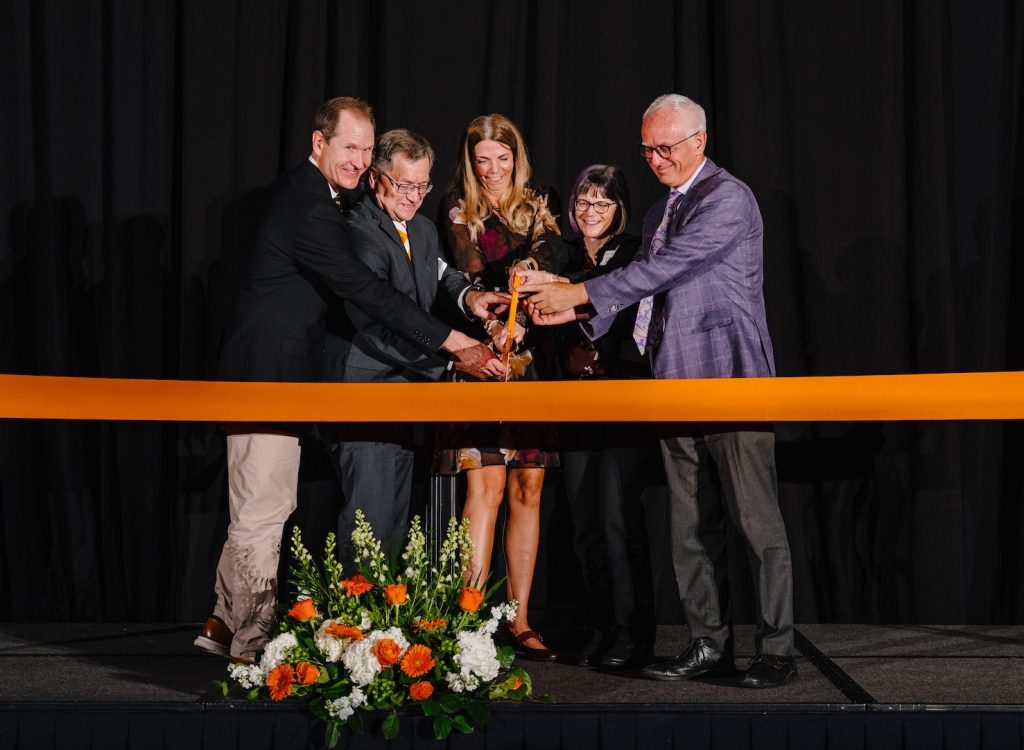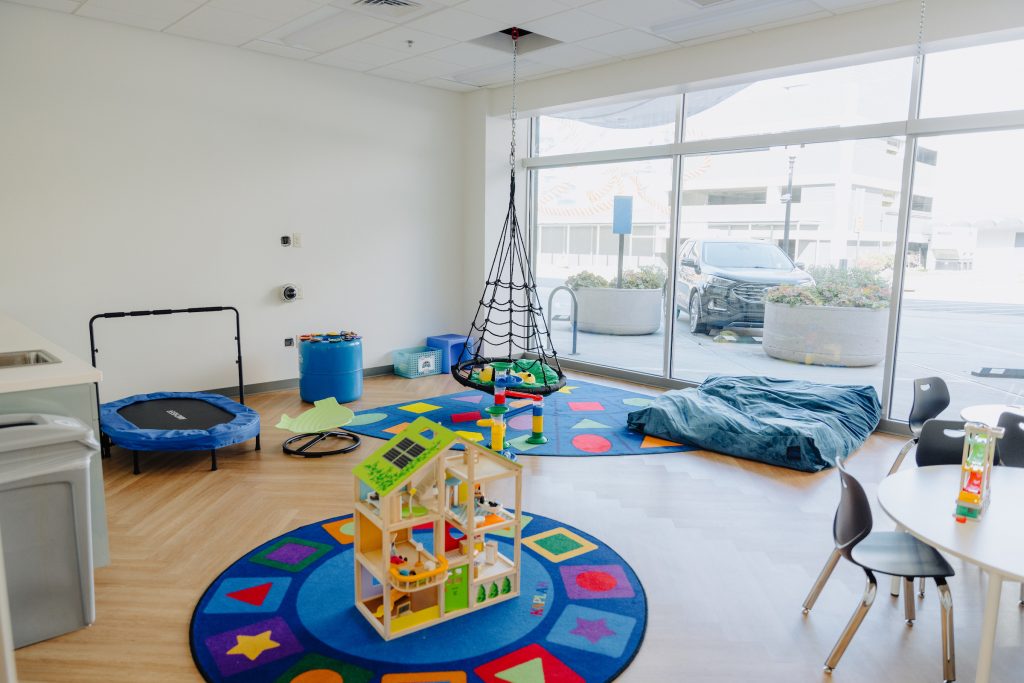
The Department of Audiology and Speech Pathology at the University of Tennessee Health Science Center held a grand opening ceremony of its renovated state-of-the-art space at the UT Conference Center at 600 Henley, St. in Knoxville, TN on Friday, October 25.
The almost $20 million, four-year renovation of the UT Conference Center increases the department’s space to approximately 65,000 square feet and will help support the department in many areas, including its focus on interdisciplinary care. Previously, the department operated in three different spaces on the campus of UT Knoxville. The renovation gathers its academic, research, and clinical operations under the same roof for the first time in 40 years.
Among other educational, clinic, and research spaces, the new facility adds a large lecture hall to seat 124 students; an apartment simulation; an indoor inclusive playground; a feeding, swallowing, and voice suite; a dizziness and tinnitus suite; student study rooms; 13 research laboratories; and the Silverstein-Luper Alumni and Visitor Welcome Center.
“All of our faculty, students, and clinical enterprises are all in the same building now, which really encourages collaboration and interdisciplinary activity. It benefits our students, patients, faculty, our research, and is a win for everyone,” said Ashley Harkrider, PhD, professor and chair of the Department of Audiology and Speech Pathology.
“We’ve already taken a few steps forward, we have a few social work students and an occupational therapy student doing their clinical practicums here, and an occupational therapist in our faculty,” Dr. Harkrider said. “We have them embedded in our clinics and they are working with our ASP clinical faculty and students for the benefit of our patients. We would love to head in the direction of a center of excellence for interdisciplinary care for individuals with communication disorders.”
The opening ceremony included guided tours of the new space in the UT Conference Center, followed by a reception at the Knoxville Convention Center. In addition, the ceremony featured a welcome from the UT System President Randy Boyd. The ceremony’s speakers included Stephen Alway, PhD, dean of the College of Health Professions; Lisa Cunningham, PhD, scientific director in the National Institute on Deafness and Other Communication Disorders of the National Institutes of Health; John Little, MD, pediatric otolaryngologist at the Children’s Ear, Nose, and Throat Specialists in Knoxville; and UT Health Science Center Chancellor Peter Buckley, MD.

“This wonderful new facility was the result of partnerships with the state, UT administrations, our faculty, staff, students, alumni, patients, and community supporters,” Dean Alway said. “I want to congratulate the outstanding faculty and staff in the Department of Audiology and Speech Pathology who, under the vision and leadership of Dr. Harkrider, could see the possibilities of what the future for ASP could be. This is a wonderful milestone that will be the launch pad for many great things to come for ASP and will provide an opportunity for interdisciplinary training and clinics that will impact not only the eastern side of Tennessee but well beyond the borders of our state.”
Phase one of the renovated space was completed in June 2021 after the hearing and balance services, research labs, and administrative offices transitioned out of Neyland Stadium. Phase two was completed this past August with the overhaul of two additional floors in the UT Conference Center.
The indoor inclusive playground is named in recognition of Tamika Catchings, retired professional WNBA star, four-time Olympic gold medalist, and former UT Lady Vol, who received assistance from the department during college for her hearing loss.
The Tamika Catchings Inclusive Playground will encourage communication and meet the therapeutic needs of children in the speech and hearing clinics. The department was recently awarded an $8,000 grant from the UT Alliance of Women Philanthropists for the purchase of equipment for the inclusive playground.
“We are really excited for what this thoughtfully designed playground is going to afford for our patients, the patients’ families, our students, and our faculty,” Dr. Harkrider said. “The funding will be used to purchase pieces of equipment that will be different from anything else we have in our therapy or exam rooms. For example, we are purchasing a video projector that will project onto the floor various activities that we can use to interact with our patients, allowing us to be interactive and playful but working on ways to communicate peer activities for our patients who will be in those situations more often.”

The new Activities of Daily Living (ADL) Apartment gives a realistic home atmosphere for audiologists and graduate students to use to practice interacting and assisting patients in every-day routines.
The feeding, swallowing, and voice suite, one addition to their expanded clinical spaces, is a suite of rooms where clinical faculty in the area of feeding, swallowing, and voice disorders will treat patients and educate students.
“For our patients, the benefits are sort of limitless. The spaces are much easier for patients to maneuver, and we have a lot of specialty clinics which require spaces that are tailored to those specialties,” Dr. Harkrider said. “We were able to design those spaces to accommodate what was needed to do effective diagnostic and therapeutic work with patients that need those specialty areas.”
“At our previous location, we did not have enough rooms to accommodate patients with mobility limitations. We had to be extremely careful and strategic with our scheduling. Now, we have enough rooms to schedule patients as needed and ensure they can safely get to each room,” said Angie Orr, clinical assistant professor in the department. “In addition, there are spaces for everyday living tasks and support groups, which elevates our abilities to provide functional, real-life activities. I am looking forward to expanding our services to offer additional support groups to reach more individuals in our community.”
The large lecture hall allows faculty to teach lectures in the center and features interactive monitors, an assistive listening system for in-class audio for students and special access for students with hearing impairments.
“When we were all in separate spaces, I felt disconnected from the students and faculty who were still on campus. With the new space, there’s a huge improvement in communication and connectedness,” said Devin Casenhiser, professor and program director in Speech Pathology. “The new classroom space is great. Students are more comfortable and spend far less time traveling between classes and clinic, which were often split between the UT Knoxville main campus and our building downtown.”
The department is the area’s only academic hearing and speech clinics. It offers degree programs for undergraduate, graduate, and doctoral education in audiology and speech pathology. This year, the department’s Doctor of Audiology program reached the top 25 of audiology programs in the country with its ranking at No. 22 in the U.S. News & World Report’s Best Graduate Schools list for 2024.
